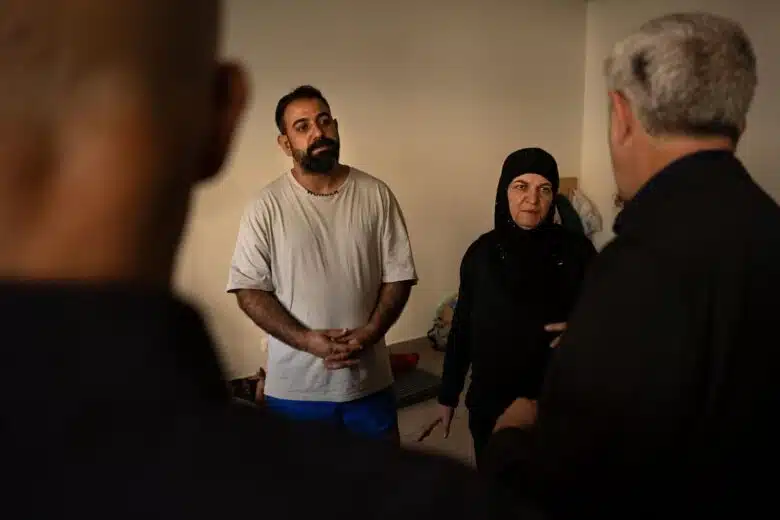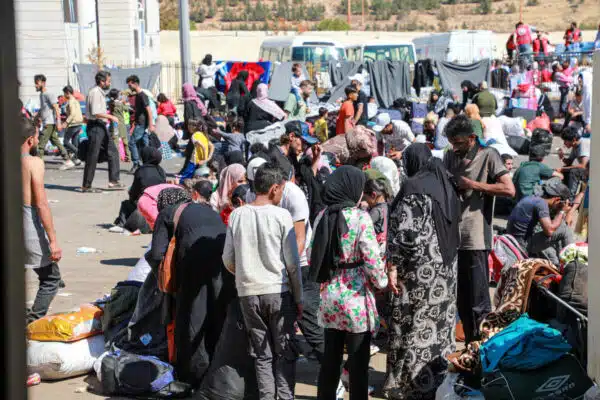
An elderly woman and two young children sit in the classroom of a school in central Beirut housing displaced families. © UNHCR/Ximena Borrazas
In Lebanon, UNHCR’s Grandi urges increased international support and an immediate ceasefire to ease the plight of some 1.2 million people displaced by deadly airstrikes
By Dalal Harb and Houssam Hariri
At a school in the Burj Hammoud neighbourhood of the Lebanese capital Beirut, classrooms and corridors that once rang with the sound of schoolchildren are now filled with exhausted families fleeing two weeks of deadly airstrikes that have killed hundreds and displaced an estimated 1.2 million people across the country.
One of the classrooms is now home to Umm Hassan Baisi, a Lebanese woman from the southern city of Nabatieh who fled with her daughter and grandchildren after their home was badly damaged. Following an arduous two-day journey by car to reach the capital, she and her daughter spent several days sleeping on the streets while the children slept in the vehicle.
“I left with my daughter under the bombardment. We barely made it,” Umm Hassan said. “We slept outside for two or three days until they found space in this school for us … Everyone is psychologically drained, not just us here inside the school – everyone.”
They are sharing the classroom with another displaced family. Mattresses are arranged on the floor and their belongings are packed into plastic bags hanging from the walls on pupils’ coat hooks.

Umm Hassan (second from right) meets UN High Commissioner for Refugees Filippo Grandi (right) in the Beirut school where she and her family are currently living. © UNHCR/Ximena Borrazas
While Umm Hassan described conditions inside the school as uncomfortable, she said they were “a million times better” than being on the streets. What she and the other 1,200 people currently living at the school hope for more than anything is an end to the attacks and a lasting solution to the crisis that will allow them to return home.
“Half of my house was destroyed,” she said. “We hope that we will return home and this situation is solved, for everyone displaced to return to their home. We hope that we can … rebuild and go back to how we were living.”
During a visit to Lebanon on Sunday to express his solidarity and mobilize support for those affected, UN High Commissioner for Refugees Filippo Grandi met with Umm Hassan and other families living at the school. Afterwards, he called for an urgent ceasefire and greater international support to respond to the unfolding humanitarian catastrophe.

Filippo Grandi and members of UNHCR staff walk through a neighbourhood of the Lebanese capital. © UNHCR/Ximena Borrazas
“This should be a place where children go to learn, to play, to spend time together. And yet, in the past few weeks, this has become a makeshift shelter for 1,200 people displaced from other parts of Lebanon that are currently affected by the conflict,” Grandi said.
“We need of course to provide people that are stranded in locations like this school with the basics: food, cash, water and sanitation, and items for everyday survival,” he added. “But most of all, we need this situation to stop. What is needed in this country, first and foremost, is a ceasefire … so that all the people that are displaced and all those that are affected can resume their normal lives.”
Emergency response
Since the start of intensified Israeli airstrikes on 23 September, teams from UNHCR, the UN Refugee Agency, have been supporting the government’s response efforts. Staff are delivering emergency items including blankets, mattresses and medical trauma kits, and equipping many of the 900 temporary shelters opened by the authorities in schools and other public buildings to house displaced families.
In addition to the 1.2 million people estimated by the government to have fled their homes, between 200,000 and 300,000 people have crossed the border from Lebanon into Syria to escape the airstrikes, including Syrians, Lebanese and Palestinian refugees.
Just across town in the Barbir neighbourhood of the capital, Shaza Faris is a 59-year-old Syrian refugee who has lived in Lebanon since fleeing Damascus in 2013. She and her extended family are now crammed into her brother’s small three-roomed apartment along with his wife and four children after fleeing their home in Beirut’s southern suburbs amid heavy airstrikes two weeks ago.
“There was no time to take any decisions. As soon as the strike started, we fled,” Shaza said. “My granddaughters are 9, 7 and 3 years old. They started crying and screaming. The eldest said: ‘Get us out of the war. There’s war here and we don’t want to stay’.”
Shaza works as a volunteer with the NGO Caritas and continues to help those she can despite her own family’s displacement.
“We check on the Lebanese people and colleagues who have been displaced. We try to help them as much as possible to provide accommodation and other requirements like food,” she explained. “We check on all people here, be it Lebanese, Syrian or Palestinian. We’re all human beings.”
Like everyone affected by the ongoing crisis, her main wish is a return to normality as quickly as possible.
“We hope that the situation gets better and that we can go back to our home, go back to our safe life,” Shaza concluded. “May God heal the injured and bring back security and safety to Lebanon.”
Originally Published by UNHCR, 6 October 2024.





